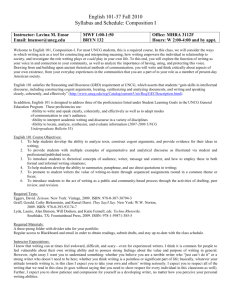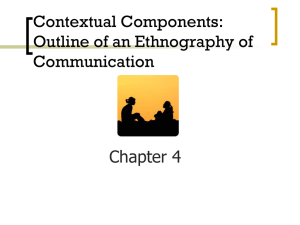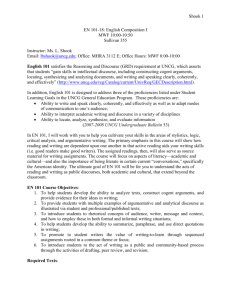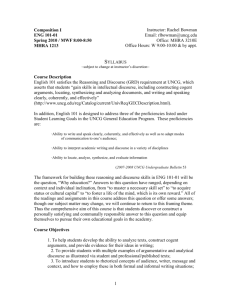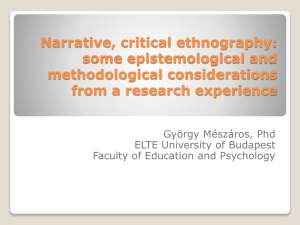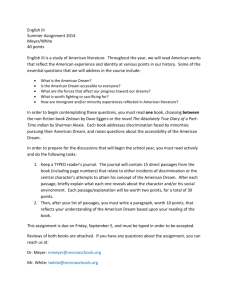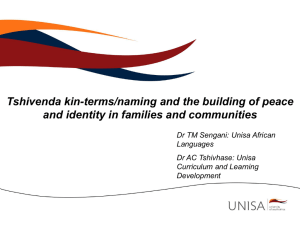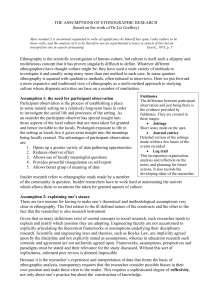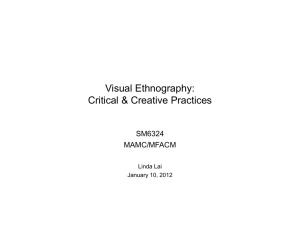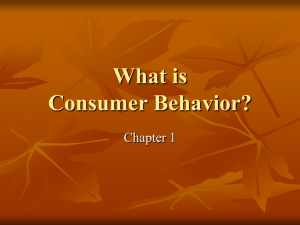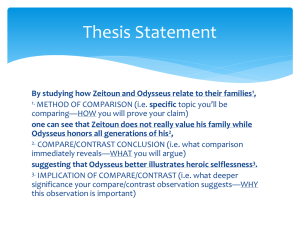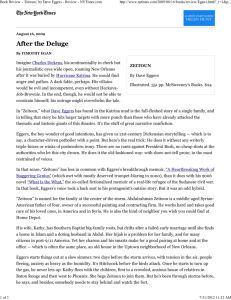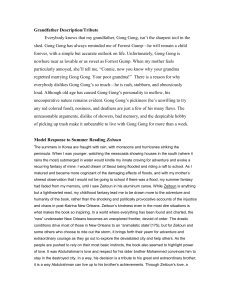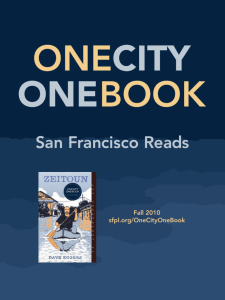101-26. Ensor
advertisement
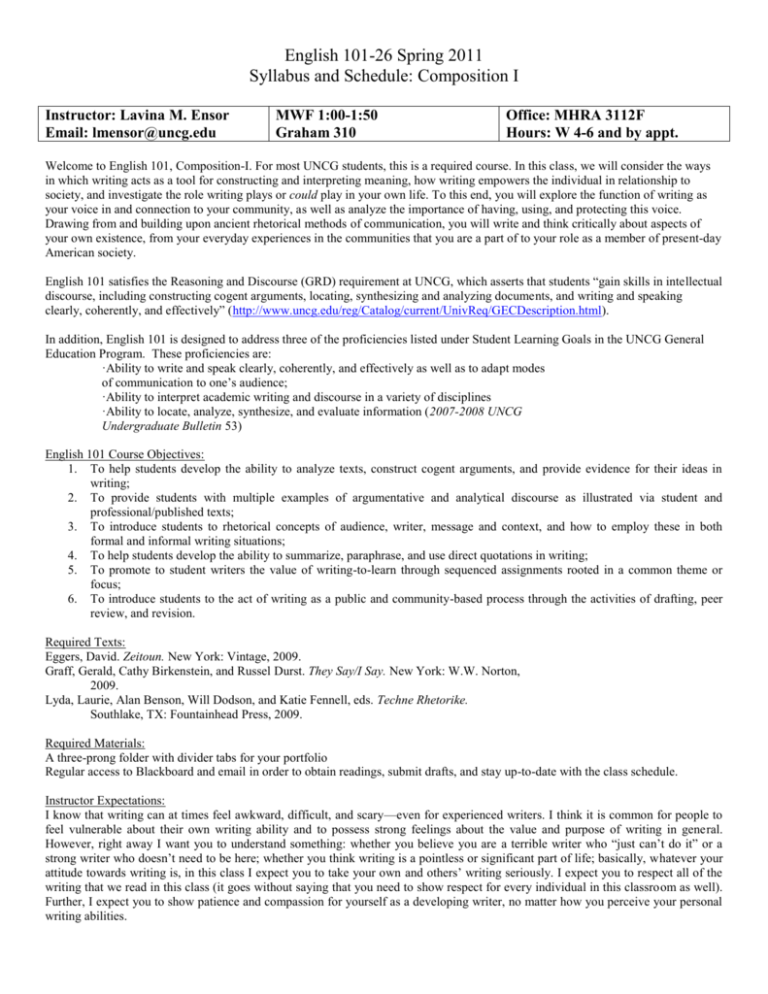
English 101-26 Spring 2011 Syllabus and Schedule: Composition I Instructor: Lavina M. Ensor Email: lmensor@uncg.edu MWF 1:00-1:50 Graham 310 Office: MHRA 3112F Hours: W 4-6 and by appt. Welcome to English 101, Composition-I. For most UNCG students, this is a required course. In this class, we will consider the ways in which writing acts as a tool for constructing and interpreting meaning, how writing empowers the individual in relationship to society, and investigate the role writing plays or could play in your own life. To this end, you will explore the function of writing as your voice in and connection to your community, as well as analyze the importance of having, using, and protecting this voice. Drawing from and building upon ancient rhetorical methods of communication, you will write and think critically about aspects of your own existence, from your everyday experiences in the communities that you are a part of to your role as a member of present-day American society. English 101 satisfies the Reasoning and Discourse (GRD) requirement at UNCG, which asserts that students “gain skills in intellectual discourse, including constructing cogent arguments, locating, synthesizing and analyzing documents, and writing and speaking clearly, coherently, and effectively” (http://www.uncg.edu/reg/Catalog/current/UnivReq/GECDescription.html). In addition, English 101 is designed to address three of the proficiencies listed under Student Learning Goals in the UNCG General Education Program. These proficiencies are: ·Ability to write and speak clearly, coherently, and effectively as well as to adapt modes of communication to one’s audience; ·Ability to interpret academic writing and discourse in a variety of disciplines ·Ability to locate, analyze, synthesize, and evaluate information (2007-2008 UNCG Undergraduate Bulletin 53) English 101 Course Objectives: 1. To help students develop the ability to analyze texts, construct cogent arguments, and provide evidence for their ideas in writing; 2. To provide students with multiple examples of argumentative and analytical discourse as illustrated via student and professional/published texts; 3. To introduce students to rhetorical concepts of audience, writer, message and context, and how to employ these in both formal and informal writing situations; 4. To help students develop the ability to summarize, paraphrase, and use direct quotations in writing; 5. To promote to student writers the value of writing-to-learn through sequenced assignments rooted in a common theme or focus; 6. To introduce students to the act of writing as a public and community-based process through the activities of drafting, peer review, and revision. Required Texts: Eggers, David. Zeitoun. New York: Vintage, 2009. Graff, Gerald, Cathy Birkenstein, and Russel Durst. They Say/I Say. New York: W.W. Norton, 2009. Lyda, Laurie, Alan Benson, Will Dodson, and Katie Fennell, eds. Techne Rhetorike. Southlake, TX: Fountainhead Press, 2009. Required Materials: A three-prong folder with divider tabs for your portfolio Regular access to Blackboard and email in order to obtain readings, submit drafts, and stay up-to-date with the class schedule. Instructor Expectations: I know that writing can at times feel awkward, difficult, and scary—even for experienced writers. I think it is common for people to feel vulnerable about their own writing ability and to possess strong feelings about the value and purpose of writing in general. However, right away I want you to understand something: whether you believe you are a terrible writer who “just can’t do it” or a strong writer who doesn’t need to be here; whether you think writing is a pointless or significant part of life; basically, whatever your attitude towards writing is, in this class I expect you to take your own and others’ writing seriously. I expect you to respect all of the writing that we read in this class (it goes without saying that you need to show respect for every individual in this classroom as well). Further, I expect you to show patience and compassion for yourself as a developing writer, no matter how you perceive your personal writing abilities. Instructional Procedures To ensure that students receive a well-rounded, interactive educational experience in this course, the day-to-day format will incorporate aspects of cooperative learning. Students will work in groups of all sizes and shapes and participate in peer review sessions. Students will also be required to do a fair amount of in-class writing, in which they will critically respond to various readings. Course Requirements Readings for class must be done before class, not during. Frequently, class will begin with a quiz covering that day’s reading material. In-class writing will be a consistent part of students’ experience in this course and will heavily influence their overall participation grade. It will take place either at the beginning or end of class in effort to help students generate and organize ideas. These writings will not be graded on mechanics; however, they need to evidence careful and critical consideration of readings and/or class discussions. Consistent participation helps facilitate everyone’s learning process and create a meaningful, focused classroom ambiance; it is essential to maximizing a student’s educational experience in a course like this. Therefore, each and every student is expected to actively and thoughtfully contribute to class discussion, small group work, and peer review sessions. Students will accrue points for participation on a daily basis—which means that a student must actively participate during each class period in order receive all possible participation points. Writing Assignments: Students will write 3 major academic essays in this course; a brief description of each is listed on this syllabus. Students will also be responsible for turning in 3 shorter critical reading responses over the course of the semester. Detailed assignment sheets containing each essay’s specific requirements will be handed out in class. Paper 1—Advertisement analysis: students will choose an advertisement and write a 1000-1200 word essay analyzing the rhetorical components of that ad. Paper 2—All-Campus Read: Students will analyze David Eggers’ Zeitoun in terms of how and why the text does/does not make a good choice for the All-Campus Read project. Paper 3— Career Ethnography Research Paper: Students will research a particular job in their field of interest and write an essay that is both informative and analytical, exploring the possible complications involved in pursuing this line of work and providing a rational for why this career choice does/does not make sense for the student. Portfolio At the end of the semester, you will submit a writing portfolio for formal evaluation. Your portfolio will include examples of work you have done for 101, including informal and formal writing. These should be either bound at Kinko’s or UNCG Graphics and Printing on Tate St. or placed in a three-prong folder (not a binder). See the handout on Blackboard for more information. Late Work Essays will be penalized one full letter grade for each day late. Essays will not be accepted at all more than 3 days after the original due date. Any extensions must be formerly negotiated with instructor and will not be granted lightly. **In order to pass this class, students must complete and submit all assignments** Attendance Students in MWF classes are allowed a maximum of three absences without a grade penalty; students in TR classes are allowed two absences without such penalty. Students who miss six classes on a MWF schedule, or four classes on a TR schedule, will fail the course. Also note: students are allowed two absences without penalty for observance of religious dates and holidays. Please speak to instructor regarding these absences. Laptops Laptops may be used in class only to take notes pertaining to our class or to view documents on our Blackboard website. Any student who uses a laptop for any non-classroom activity during class time will not be allowed to use a laptop in class again. To be perfectly clear: one violation means no laptop use. **Talking, texting, web surfing, or playing games on cellular phones is never, ever allowed. Turn phones off or set them to silent before class. DO NOT MERELY PLACE ON VIBRATE: I DON’T WANT TO HEAR THEM. If a student makes a habit of accessing her/his cell phone during class, s/he will simply be asked to leave, forfeiting attendance and participation points for that day. Grading A=90-100 B=80-89 Final grades will factor accordingly: C=70-79 Paper 1—10% Paper 2—10% D=60-69 F=59 on down Ethnography (w/mini-presentation)—20% Quizzes: 5% Portfolio—30% Participation/Homework: 15% Critical Responses: 10% (5% each) Academic Honesty “Academic integrity is founded upon and encompasses the following five values: honesty, trust, fairness, respect, and responsibility. Violations include, for example, cheating, plagiarism, misuse of academic resources, falsification, and facilitating academic dishonesty. If knowledge is to be gained and properly evaluated, it must be pursued under conditions free from dishonesty. Deceit and misrepresentations are incompatible with the fundamental activity of this academic institution and shall not be tolerated” (from UNCG’s Academic Integrity Policy). To ensure that you understand the university’s policy on academic integrity, review the guidelines and list of violations at <http://academicintegrity.uncg.edu>. I expect you to abide by the Academic Integrity Policy. Disability Services: Students with documentation of special needs should arrange to see me about accommodations as soon as possible. If you believe you could benefit from such accommodations, you must first register with the Office of Disability Services on campus before such accommodations can be made. The office is located on the second floor of the Elliott University Center (EUC) in Suite 215, and the office is open 8am to 5pm, Monday - Friday. Telephone: 334-5440; e-mail: ods@uncg.edu. The Writing Center: The purpose of the Writing Center is to enhance the confidence and competence of student writers by providing free, individual assistance at any stage of any writing project. Staff consultants are experienced writers and alert readers, prepared to offer feedback and suggestions on drafts of papers, help students find answers to their questions about writing, and provide one-on-one instruction as needed. Located in the Moore Humanities and Research Building, room 3211. English 101-26 Schedule (subject to change) Abbreviation key: BB=Blackboard TS/IS=They Say/I Say TR= Techne Rhetorike Week 1 M 1/10 W 1/12 F 1/14 Activities/Topics Intros; syllabus In-class writing diagnostic Intro to peer review and Revision Readings ----TR pp. 76-80 Assignments/Materials Due ----Bring 3 copies of your Writing Diagnostic essay to class Martin Luther King Jr. Holiday—no class Grammar/usage Intro. to rhetorical concepts --- --- TR 253-277 TR 12-23 --Write 100 word summaries each of ethos, logos, and pathos. Print and bring to class. M 1/24 Template exercises --- W 1/26 Intro. to analyzing visual media TBA TS/IS Preface and Introduction TR 148-156 TS/IS Chapters 1 & 4 --- In-class ad analysis; constructing a thesis Revision Peer Review: Paper 1 TR pp. 131-135 Bring chosen ad to class TR 76-80 --- --3 Copies of your STAPLED rough draft Intro. to Eggers’ Zeitoun; Assign Paper # 2 Portfolios; Understanding Paper #2 Ethnography reminder; summarizing and quoting Zeitoun 3-49 Revised Draft of Paper 1 due to BB by midnight --- Summarizing and quoting Citations Ethnography check-in #1 Zeitoun 81-146; Zeitoun 146-202 Zeitoun: 205-283 ----Ethnography prospectus due in class Brainstorming with TS/IS; Citations Paper #2: formatting your argument TS/IS Chapter 4; TR 131135 Zeitoun: the end --- Week 2 M 1/17 W 1/19 F 1/21 Week 3 F 1/28 Week 4 M 1/31 W 2/2 F 2/4 Week 5 M 2/7 W 2/9 F 2/11 Week 6 M 2/14 W 2/16 F 2/18 Week 7 M 2/21 W 2/23 F 2/25 Week 8 M 2/28 W 3/2 F 3/4 TR 184-189; Zeitoun 5080 TS/IS: Chapters 2-3; TR pp. 140-146 Peer Review Session: Paper 2 --NO CLASS--Conferences: instructions forthcoming NO CLASS--Conferences Library session --- Critical response #1 due in class Draft and bring 3 copies of your opening paragraph (with thesis statement) for Paper #2 to class to workshop 3 Copies of your stapled rough draft --- --- ----- --Revised draft of Paper #2 due in BB by midnight Week 9 M 3/7 W 3/9 F 3/11 Week 10 M 3/14 Spring Break Spring Break Spring Break ------- ------- Discussion: personal research strategies Annotation practice TR 112-117 Bring 3 sources for ethnography to class TR 124-127 TBA TS/IS selected reading Bring 100 word annotations of your 3 sources to class --- BB reading Critical response #2 due in class W 3/23 Understanding ethnographic research Tone and rhetoric TR 69-75 F 3/25 Ethnography check-in #2 --- Bring copies of critical response 2 for tone workshop Outline of Ethnography/Draft of Introduction due in class Constructing the argument within your ethnography Discuss critical response #3 TBA TS/IS 213-235 --- BB reading BB reading ----- Workshop: thesis statements and arguments for ethnography Citing, citing, citing! --- Bring ethnography thesis statement and outline of argument to class TR 280-309 NO CLASS-CONFERENCES --- Bring citations of all your ethnographic sources to class ***Print and bring HARD COPIES of Ethnography drafts/materials to conference*** --- --- W 4/13 NO CLASS-CONFERENCES Peer Review: Ethnography --- F 4/15 Presentations --- Bring 3 copies of your stapled rough draft to class Critical Response #3 due in class; BRING COPIES OF PP SLIDES AND BACKUP COPY OF PRESENTATION Presentations Class evaluations; portfolio clarifications Spring Vacation—No class ----- “ --- --- --- Last day of class --- Bring drafts of reflection essay to class W 3/16 F 3/18 Week 11 M 3/21 Week 12 M 3/28 W 3/30 F 4/1 Week 13 M 4/4 W 4/6 F 4/8 Week 14 M 4/11 Week 15 M 4/18 W 4/20 F 4/22 Week 16 M 4/25 FINAL EXAM SESSION TO BE HELD DURING FINALS WEEK Thanks everyone! Take care!
